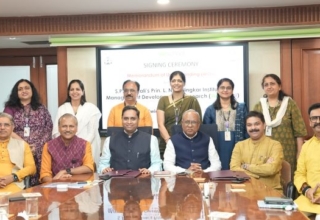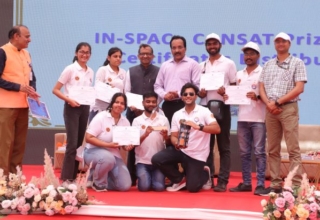The 12th edition of Global Skills Summit spread over two-day (Sep 19-20) and organized by FICCI in New Delhi proved a platform of storytelling by the proud medal winners at Worldskills Competition 2019 as they were rewarded and celebrated. The occasion also brought into focus some of the laudable initiatives in skills domain in the country as also food for thought and prescriptions

The stories of all four winners, who are getting all the attention in the country that they deserve, are both inspirational and motivational at the same time. All of them have transformed into icons after the win and they are very honest in humble in admitting it is beyond their own imagination. “After coming back, when we landed in India, did the feeling of something big set in,” said Shweta Ratanpura, a student at the National Institute of Design, Ahmedabad, who won bronze medal in Graphic Design.
25-year old Aswatha Narayana Sanagavarapu, an alumnus of C V Raman College of Engineering (CVRCE), Bhubaneswar (Odisha), who is India’s first- ever gold medalist in Worldskills International Competition after winning the country’s lone gold medal at the 45th WorldSkills Competition held in Russian city of Kazan from August 23-27, 2019, in fact never dreamt of the medal in the first place. “I knew this is going to be once a lifetime opportunity and I didn’t think much about winning gold but concentrated on it till the very end. I stayed this course and within constraints worked to give my best without giving way to pressure of the expectations or that of the mega event,” he said while explaining his winning journey.
The incredible story of bronze medalist in jewellery, Sanjoy Pramanik is really cast in the disbelief and hope. Coming from Gajonkol in West Bengal, as a boy, owing to poverty, he had to give up his studies after class 8 to help in supplementing family income and join his uncle as an assistant artisan at a jewelry shop in Bengaluru in 2013. His uncle spotted spark and talent in him and as they came to know about World Skill India, he took part in it and never looked back. After coming in touch with NSDC ecosystem, he participated in two international competitions in Australia and France. “I didn’t eat on the third day of competition at Kazan as I was tense and didn’t want to lose the challenge that will make my country proud at world stage,” he said. He is happy that now his school back home has acknowledge him in the honor roll call.
17- year-old Pranav Nutalapati of The Legacy School, Bengaluru has raised the bar by winning the Silver Medal for Web Technology legacy. “No none in India earlier knew that Worldskills exists, now that all has changed. In fact, I couldn’t help in saying that when I spotted a text written on a hand band saying ‘where there is skill, there is a way’, it has become a dominating thought in me,” he said. Pranav started at 12 years of age and to begin with it was a non-serious engagement but whence hi talent was spotted, NSDC system ensured his training and interest. “I have become confident from a shy person and could stand up before 40 thousand people,” he said.
Shweta Ratanpura, recalled how she had to convince her father hard to join design than engineering and today she has been proved right. “It was wonderful, intense and I enjoyed meeting so many people. The journey of last one year where I had to put 8-10 hours of training daily, maintain physical fitness including yoga has made a confident person and importantly I got to know about options,” she added.
The inspiring story of S Aswatha Narayana and his stellar achievement also resonates with India’s aspirations to become the skill capital of the world. And in a way, his gold has proved it can be done if there is seriousness and attitude in the system as well as the individual. What is special about his feat is that he is neither a chemical engineering student nor an environmental science student;-both disciplines connected to water and yet, he ventured and succeeded in a skill where even there is no previous reference point.
Aswatha’s challenge at Kazan involved treatment of sewerage water, plant manufacture, maintenance and repair . The challenge spread over four-days had five modules of engineering aspects. Broadly the competition required to perform chemical & biological analysis to achieve optimum dosages of chemicals in the treatment process in the first chemical module, second was mechanical module where the pump and vale had to be fixed, third was automation, where a miniature plant was to be assembled, fourth was virtual reality module in which sensors irregularity was to be addressed and fifth was documentation and report preparation. “It isn’t the usual laboratory like procedure or setting but an actual real world problem situation. The model is virtual reality stimulated and you have to identity and fix the problem by applying the best practices and benchmarked industry standards. You have to match it or come as much near to that to win,” he says.
Aswatha, son of a teacher and a homemaker mother completed his B Tech in applied electronics and instrumentation engineering only this year. He along with his family had migrated to Bhubaneswar eight years ago from Andhra Pradesh after finishing his class 10 but had to complete his +2 through open schooling (AP Open School Society) due to this transition. However, that didn’t deter him in any way in qualifying Odisha Joint Entrance Exam and in 2015 he was admitted in CVRCE, Bhubaneswar. And he has graduated this year with an impressive CGPA of 8.2.
Aswatha, who has already got an iconic status in the country for creating history, is going to pursue masters in water technology in Germany next year. In the intervening period, he will wrok at Fresto plant in Germany and also be an ambassador of skills mission in India and abroad. Eventually, he wants to work at a water treatment facility. “This journey has taught me that WorldSkills is a platform which opens up the world to you. You come in contact with real industry people and they notice you. Your training helps you in leapfrogging career progression as you learning so much in short period that otherwise takes years and importantly the mentors broaden your horizon,” he adds.
In India, where about 30% of youth are not in productive work and graduates just idle away, people are still the biggest wealth. An acceptance of skilling by society, will open doors to millions of them within the country and abroad and the four successes this year have set the ball in motion.
Odisha state, which is perhaps the most enthusiastic state over skilling education, is already a success into making and in doing so, it is creating a model for the entire country. “To shift the conversation from skill to skilled in Odisha, we are creating an aspirational branded idea that the best people come from Odisha,” said Subroto Bagchi, Chairman, Odisha Skill Development Authority. He further added that we need to show our kids the role models at an early age that make it aspirational for them to pursue the passion they have.
In words of TV Mohandas Pai, Honorary Adviser, FICCI Skills Development Committee and Chairman, Manipal Global Education every state in India has diversity hence each state needs to have its own skill policy basis their own requirements. He advocated recognition of prior knowledge and a degree to highly skilled farmers to bring in respectability that society desires.











